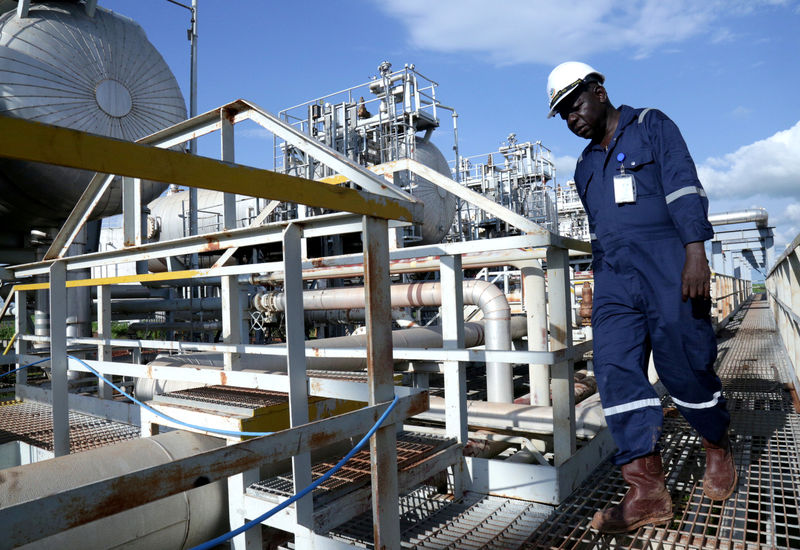By Henning Gloystein
SINGAPORE (Reuters) - Oil prices dipped on Thursday as emerging market turbulence weighed on sentiment, while a deadline neared for a potential new round of U.S. tariffs on another $200 billion of Chinese goods.
U.S. sanctions against Iran, however, prevented prices from falling further as they are expected to tighten the market after being implemented from November, traders said.
U.S. West Texas Intermediate (WTI) crude futures (CLc1) were at $68.59 per barrel at 0645 GMT, down 13 cents, or 0.2 percent, from their last settlement.
Brent crude futures (LCOc1) fell by 4 cents, to $77.23 a barrel.
Emerging market woes are weighing on global economic growth prospects, with Asian shares on Thursday heading for their sixth straight session of losses.
Brent curve is in backwardation: https://tmsnrt.rs/2wOnOhE
Meanwhile, a public comment period on possible U.S. tariffs on another $200 billion of Chinese goods ends on Thursday, with expectations that U.S. President Donald Trump will impose the additional levies.
"The prospects of increased supplies from OPEC and her allies, and weaker demand from China and other emerging markets could weigh further on oil prices going forward, or at least limit the upside potential," said Fawad Razaqzada, analyst at futures brokerage Forex.
"This is because of the U.S. dollar's strength, weighing heavily on emerging market currencies, including the yuan, which in turn has pushed up the costs of all dollar-denominated commodities," he said.
OIL DEMAND STILL STRONG
U.S. crude stockpiles fell last week as refineries boosted output amid strong consumption, data from industry group the American Petroleum Institute showed on Wednesday.
Crude inventories fell by 1.17 million barrels to 404.5 million barrels in the week to Aug. 31, while refinery crude runs rose by 198,000 barrels per day (bpd), the data showed.
The Organization of the Petroleum Exporting Countries (OPEC) said on Wednesday it expected global oil demand to break through 100 million bpd for the first time this year.
Meanwhile, there are concerns that U.S. sanctions against Iran, which will target the OPEC-member's oil industry from November, will tighten global supply.
A further risk is seen in OPEC-member Venezuela, where a government and political crisis has halved oil production in the last two years to little more than 1 million bpd.
David Maher, managing director for energy at commodity trading house RCMA Group, said Venezuela's "declines will continue" as a "lack of cash and infrastructural collapse (are) not easy to fix".
U.S. investment bank Jefferies said "the Brent forward curve has inverted to backwardation, signalling a tightening market that already feels the effects of declining Iranian exports."
Backwardation describes a forward curve <0#LCO:> in which prices for immediate delivery are higher than those for dispatch later on. This signals tight market conditions as it gives traders an incentive to immediately sell oil instead of putting it into storage.
Front-month Brent crude is currently more than $3 per barrel more expensive than for September 2019.
RCMA's Maher said he expected Brent prices to average $80 per barrel in 2019.
